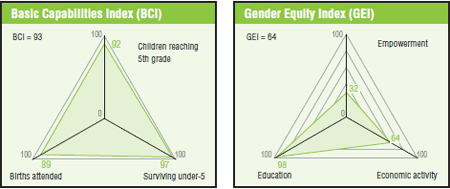Azerbaijan
Lower Oil Revenues, Higher Public Debt: The Implications of Low Oil Prices and Challenging Financing for Sustainable Development
This article examines fiscal policy and the main parameters of Azerbaijan’s fiscal position in the context of the severe constraints (namely, reduced budget revenues and cuts in government spending) posed by the decline in crude oil prices. These constraints can also hamper the financing of sustainable development initiatives. Azerbaijan’s fiscal balances have deteriorated considerably as crude oil prices have tumbled. A worsening of the country’s fiscal balance could gradually contribute to an increase in the public debt burden and threaten fiscal sustainability in the long term. Azerbaijan’s sovereign wealth fund, SOFAZ, now has very limited profits from the sale of oil, and will contribute less to the fiscal revenues of the state as a consequence. The national state-owned oil-gas company, SOCAR, temporarily cancelled its plans for a new oil-gas refining and petrochemical complex because of the rapid fall in crude oil prices. However, at the same time, the new low oil price environment also offers an opportunity to boost a new wave of fiscal and public administration reforms in Azerbaijan.
Published on Fri, 2025-08-08 00:00
Dr. Kenan Aslanli participated in the Third United Nations Conference on Landlocked Developing Countries (LLDCs), that took place in Awaza, Turkmenistan, from 5 to 8, August, 2025. Dr. Kenan Aslanli’s spoke at plenary session 2: "Digital Economy, Innovation and Sustainable Development" at the Civil Society Forum. |
Published on Fri, 2016-09-16 09:10
In Azerbaijan reduced budget revenues and cuts in government spending are the result of the decline in crude oil prices, the main export of the country. The Social Watch coalition in Azerbaijan examines how these constraints can also hamper the financing of sustainable development initiatives. As crude oil prices have tumbled, a worsening of the country’s fiscal balance could gradually lead to an increase in the public debt burden and threaten fiscal sustainability in the long term. Azerbaijan’s sovereign wealth fund, SOFAZ, now has very limited profits from the sale of oil, and will contribute less to the fiscal revenues of the state as a consequence. The national state-owned oil-gas company, SOCAR, temporarily cancelled its plans for a new oil-gas refining and petrochemical complex because of the rapid fall in crude oil prices. However, at the same time, the new low oil price environment also offers an opportunity to boost a new wave of fiscal and public administration reforms in Azerbaijan. |
Published on Thu, 2014-03-13 10:27
The training on Gender-Responsive Budgeting, Budget Analysis and Policy Advocacy was organized for experts of National Budget Group (NBG) in Baku last February under the project: “Your Money, Your Future: Improving Public Finance Policy and Management in Azerbaijan”. The purpose of the training was to increase the awareness and knowledge of civil society experts about the public finance policy analysis and writing capacity, policy advocacy, gender-responsive budgeting and provide them with relevant information on the concept, tools and practices. |
Published on Wed, 2013-10-23 11:25
Radio Liberty discussed Azerbaijan’s place in the Open Budget Index (OBI) last week, as part of the “Joint Advocacy Platform” project, just on the eve of 2014 budget discussions in Parliament. Kenan Aslanli, National Budget Group (NBG) member (and Social Watch member in Azerbaijan) and social and youth activist Bakhtiyar Hajiyev participated in the program. |
Published on Thu, 2013-04-04 10:52
Despite that the poverty level in Azerbaijan decreased by 1.5 % and amounted to 7.6 % in 2011, share of poorest quintile in national income also diminished. Revenues from the oil sector could be allowed financing projects required to reach those aims by 2015. But interestingly that even in Azerbaijan receiving large revenues from oil, there wasn’t rapid increase in public funding for the social sector. The Government rather prefers to accumulate the surplus in the special oil fund and plan to use it to push forward big infrastructure projects. |
|
Published on Fri, 2012-03-16 14:25
In terms of gender equity Azerbaijan lags behind the European average and also its European neighbours. |
SUSCRIBE TO OUR NEWSLETTER







